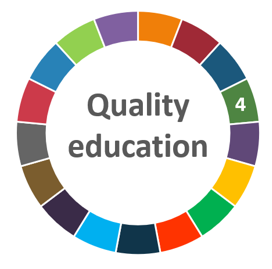
ΑΙhub.org
Team formation techniques in education

Collaborative learning is gaining acceptance as one of the most successful educational approaches to learning. The basic idea is to organise learners in groups to work together and solve problems or complete tasks. There is ample evidence that when learners actively engage in discussions, listen to different viewpoints, and defend their positions, they better understand new concepts and learn faster. A particular case of collaborative learning is co-operative learning, where each student is responsible for at least one specific aspect or competence needed to solve the problem jointly. The student is improving her understanding through collaboration with others and is also responsible for the group’s success concerning the aspect she is responsible for.

A practical problem faced by teachers applying this learning methodology is to form good teams in a practical way. It is a subject of debate what a good team is. For many, a good team shows a balance of personalities and competencies. Harmony comes from group members with similar personalities, and productive creativity comes from people with opposing personalities. A diversity of competencies guarantees that teams can complete complex tasks. Altogether, whether a team is good or not can be assessed by particular combinations of several criteria, including personality, competencies, social relations, gender, etc.
At IIIA-CSIC, we have tackled this problem using combinatorial optimisation techniques. Eduteams is a free team formation system that partitions a classroom into student teams of the same size. Partitioning classrooms is a prevalent situation in co-operative learning and sometimes a barrier for a teacher to adopt this educational approach. Through the system, students fill questionnaires to determine their personality (using a post-Jungian approach) and intelligence (following Gardner). We will use the term competence to refer to intelligence in this article. The team-scoring heuristic function used by this system scores high with personality diversity, and when at least one student is extrovert, thinking and judging, and one student is introvert. This heuristic was inspired by previous work of professor Douglass Wilde from Stanford University. On the other hand, teachers provide requirements on the competencies needed (level and importance of each competence) to complete the students’ shared task description.
The AI system tries to guarantee that the student in charge of each required competence in each team (needed, as mentioned, in a co-operative learning setting) has the teacher’s required level of competence. We use minimum cost flow methods to assign competencies to students. Each competence has at least one student responsible for it, and each student has at least one competence she is responsible for. The system uses local search techniques to improve the initial solution swapping team members and competencies in search of improvements. Simulated data show that the algorithm’s solutions are good enough and very close to the optimum for medium-sized problems, e.g. partitioning 200 students in teams of size 10. Classical optimisation techniques fail to provide a solution in a reasonable time even for small problems, like partitioning a classroom of 30 students in groups of 3. Experimental results in real settings showed that teams formed by Eduteams perform up to 25% better than teams created by teachers.
A recent line of work called Edu2Com aims at building teams of students to match job descriptions. Given a set of job descriptions and a set of students, the system forms the most appropriate team for each job. Again, the optimisation techniques aim at making the worst team-job match as suitable as possible. The objective is to maximise employability and average student and employer satisfaction. We use semantic similarity techniques to determine the ontological alignment between student competencies and job descriptions, and anytime local search hill-climbing algorithms to optimise the solution. As in Eduteams, classical (non-AI) techniques like linear programming fail to solve even small-size problem instances. Current practices involving student tutors assigning students to jobs produce very suboptimal solutions.
Team formation is essential for the physical classroom but is even more critical for online education. Teachers have very little knowledge of each student’s profile in online education settings, thus forming teams is an almost impossible task for them. AI can enable online co-operative learning and broaden students’ access to quality education as pursued by the United Nations’ fourth SDG.
Detailed information, researchers involved, papers and software can be found here.
tags: Focus on quality education, Focus on UN SDGs










